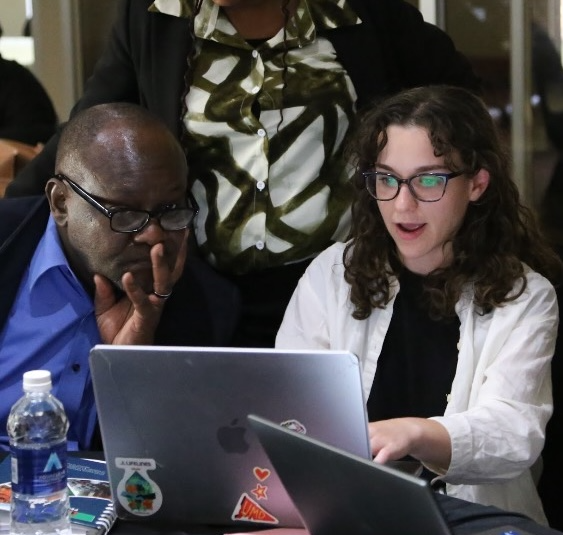Alana Ginsburg, ENSP/GEC B.S. '24
Alumni Q&A: Alana Ginsburg, ENSP/Global Environmental Change, Spring ‘24
Recent graduate Alana Ginsburg experienced the impact of climate change firsthand when Hurricane Sandy struck her hometown of Long Island, New York.
This pivotal moment inspired her to pursue a deeper understanding of environmental issues through our Global Environmental Change (GEC) concentration in the Environmental Science & Policy program.
As an alumna, Alana collaborated on research projects with faculty, participated in international capacity-building trainings and gained practical insights into the complexities of climate change.
In this conversation with GEOG, Alana reflects on her journey to becoming a geographer and offers advice to new students.
What inspired your interest in geographical sciences?
Growing up, I was a huge fan of games that tested your knowledge on state/country capitals and shapes (ex. Stack the States). However, I knew I wanted to study something related to weather impacts and climate change after experiencing Hurricane Sandy on Long Island, where I grew up. I have enjoyed studying these kinds of environmental events and learning about the physical drivers of climate change, acquiring technical skills and gaining a social science perspective through my GEOG courses.
How has your interest in geography evolved during your studies at our department?
I did not stray far from where I began, but my interest in geography has definitely evolved throughout my coursework. For much of my freshman and sophomore year, I was very interested in work directly related to decreasing carbon emissions and renewable energy. The department offers multiple courses for independent research, which allowed me to be active in research groups during the semester. I was fortunate to connect with two GEOG professors affiliated with NASA Harvest, who along with an amazing course in plant sciences, inspired my passion for agriculture as well. Additionally, I gained an interest in emergency management and natural disaster response/recovery via my courses in the ENSP department, in addition to my atmospheric science minor.
I now prefer to describe myself as a geographer rather than an environmental scientist, and I enjoy explaining how a modern geographer’s scope extends beyond just knowing names of countries and capitals to utilizing mapping and GIS.
Can you share an example of a research project or fieldwork experience that had an impact on your understanding of geography?
After graduation, I was fortunate enough to participate in two capacity-building trainings led by Dr. Catherine Nakalembe and NASA Harvest in Dakar, Senegal, and Lusaka, Zambia. I got to travel to both of these places and meet researchers, meteorologists, and agricultural ministry officials from across the continent. Getting to travel to Africa and connect with professionals in a similar field who were eager to learn new skills was awesome, inspiring and the most special moment of my college experience. There is value in how our research allows for environmental trends to be studied remotely worldwide, but such analysis is infinitely more valuable when it involves those with local knowledge and connections to the communities who inhabit the areas we study.
What's a class that you'd recommend to students?
GEOG331: Introduction to Human Dimensions of Global Environmental Change was awesome. I learned a lot and enjoyed the readings we did for it.
GEOG272: Introduction to Earth Observation Science is also an essential class.
My advice to other students is not to be afraid to challenge their computer skills!! GIS and other geospatial data analysis can be very intimidating at first—especially if you are a student who is not sure whether you are “STEM-brained” or not. Believe in yourself and don’t let that discourage you from practicing and gaining those skills.
You recently completed your degree in Environmental Science & Policy (ENSP)/Global Environmental Change. What's your next step?
I decided to take a gap year before starting Ph.D. studies in geography/environmental science (which I am currently applying to). I wanted to do a year of service after my graduation in May and was inspired by the social justice alignment of the Jewish Service Corps program called Avodah. As part of this program, I just started working with a legal aid organization in New Orleans, Louisiana on helping people facing housing insecurity.
I hope to have a variety of roles in my career, including teaching geospatial data analysis and climate services—beyond just those enrolled in four-year degree programs in the U.S.—and using these technologies to influence policies that empower communities on the frontlines of climate change. I have enjoyed projects I have done that were both nationally and internationally focused, and have many ideas of what kind of work I’d like to be involved with sometime during my career. In addition to working as a university professor, I am also interested in working for a nonprofit and as a government scientist.
Image: Alana Ginsburg with Principal Agricultural Officer Louis Chikopela [left] from Zambia's Ministry of Agriculture. Courtesy of Alana Ginsburg


